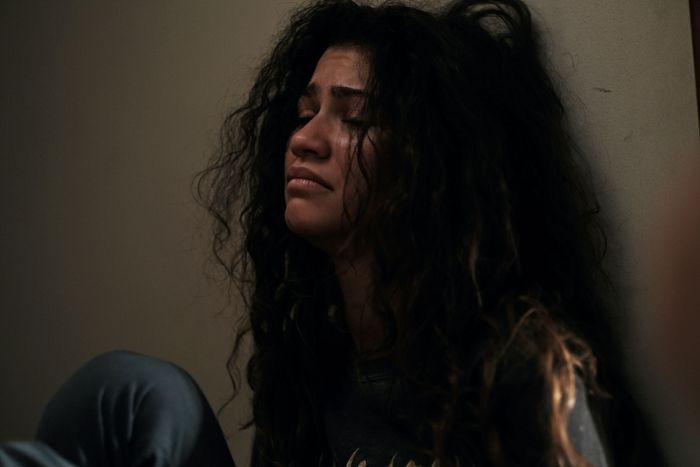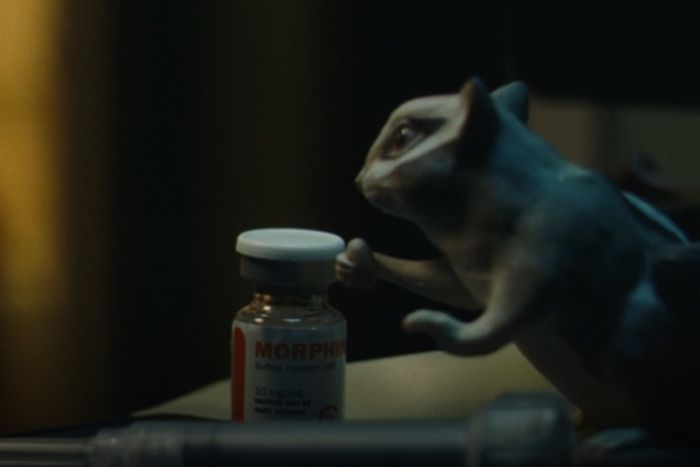
Euphoria, the HBO drama about teens in the throes of anguish and addiction, is a deliberately provocative series that has sparked strong reactions since its 2019 premiere. That’s continued through the currently airing second season, which has generated both fan enthusiasm and a ton of memes, but also highlighted numerous issues with the storytelling, including the marginalization of certain characters, most notably Barbie Ferreira’s Kat; the excessive amount of nudity that creator/writer/director Sam Levinson crams into many frames; the show’s traumatic and traumatizing nature; and an overall lack of focus.
Many of these concerns are valid; I touched on some of them in my review of season two, including that last one. But the fifth episode, “Stand Still Like the Hummingbird,” which marks the beginning of the final stretch of this often-polarizing season, arrived just in time to serve as a reminder of how powerful Euphoria can be when all its creative tools are working in service of the same goal, and why it’s so frustrating when that isn’t the case.
Certainly the performances in that episode, including an absolute tour de force by Zendaya, are some of the most emotionally raw so far in a series that doesn’t shy away from emotional rawness. But what makes “Stand Still Like the Hummingbird” such a strong testament to what Euphoria does best is its sense of focus. By keeping its narrative simple and narrow — it zeroes in on what happens to Zendaya’s Rue during a roughly 24-hour period after her mother confronts her about relapsing — this episode goes to wild, emotional, and incredibly intense places without succumbing to the storytelling sprawl that has sometimes been a liability elsewhere this season.
In keeping with Euphoria tradition, this 54-minute piece of television is doing the absolute most. But it is doing the absolute most while mostly staying in one lane. The approach mirrors the one-off specials that dropped at the end of 2020 and in early 2021, which also succeeded by stripping away some of the flashier Euphoria elements to create episodes that were exacting, intimate, and allowed the actors to submerge in their characters’ rough waters. During a week where certain social-media comments raised questions about whether the series functions episodically or as a larger piece, the latest chapter provides proof that Euphoria has as much impact in its segments as it does as a whole.
“Stand Still Like the Hummingbird” revolves entirely around Rue as she freaks out about having lost the pills that she promised Laurie, the low-key yet menacing drug dealer, that she would easily be able to distribute to her peers in exchange for $10,000. As she runs away from her mother and sister to avoid hospitalization, we stay glued to Rue’s side during her journey to various homes as she tries to steal whatever she can to compensate Laurie while coming down, in painful fashion, from an opioid high.
Very purposefully, Levinson directs each scene so that we, the audience, never learn important information before Rue does. For the first several minutes of the episode, Rue has a complete breakdown, screaming cruelties at her mother and sister, ripping apart their apartment while searching for that suitcase full of drugs, and sobbing uncontrollably. She is at her absolute lowest as a person in these moments. It’s only when her mother mentions Jules that the camera pans alongside Rue down the hall and into the living room, where Rue’s girlfriend and their friend Elliot have been sitting this entire time, listening to every unhinged second of her tirade. At first this is embarrassing. Then it provides another excuse for a trapped Rue to lash out.
This happens again when Rue goes to Lexi and Cassie’s house, sneaks into their mom’s bedroom, and snags a pair of earrings. As Rue reemerges into the hallway, we only see her back at first, then the camera reveals to us what Rue has just seen: her mother in the foyer, attempting to gather Rue and get her help. After Rue escapes that situation by lobbing the bombshell about Cassie and Nate, she gets the bright idea to sneak into a house that belongs to strangers, where she will hopefully find pills, money, or other valuables. Again, the camera doesn’t reveal the sight or sound of an extremely intimidating dog that’s in the house, or later, the surprise return of the home’s owners, until Rue becomes aware of them, too. The way the camera travels is intertwined with Rue’s perspective for almost the entire episode, not only what she sees and hears, but also the feelings overwhelming her.
“Stand Still Like the Hummingbird” is named after a collection of essays by Henry Miller and taken from this particular passage: “When you are convinced that all the exits are blocked, either you take to believing in miracles or you stand still like the hummingbird.” Rue’s exits are constantly blocked in this episode, and Levinson fills anyone watching with that same sense of dread and inability to escape. Every slow reveal and mad dash into oncoming traffic conveys the panicky desperation of being cornered. When Rue jumps out of her mother’s car to escape another stint in rehab and runs down the nearest side streets and alleys, even the sunlight shines harshly on her like an accusation, or a search light.
Euphoria has been criticized for not being entirely realistic, although realism isn’t what it’s necessarily going for anyway. “I’m not interested in realism. I’m interested in an emotional realism,” Levinson said in a Vulture interview with Matt Zoller Seitz after season one. “Stand Still Like the Hummingbird” is infused with both: It’s a study in how it feels when the haze of intoxication is punctured, and an accurate reflection of how addicts may respond when confronted by those insisting they get sober. Often, they lob the most damaging verbal grenades they can come up with to deflect attention away from themselves. That is exactly what Rue does when she accuses her mother of being a failure, or outs Cassie for her affair with Nate. As heightened as this episode can be at times, it is built on a foundation of behavior and situations that will be recognizable to many.
Only when Rue eventually gets to Laurie’s does she find a peaceful environment, which is ironic since that house is probably the most dangerous place she can be, and I am including standing in the middle of the street while cars swerve to avoid hitting her. The whole sequence at Laurie’s house captures that dichotomy. Laurie, as played by Martha Kelly with a perfect, impossible-to-read deadpan, tells Rue that she is not mad that Rue hasn’t come up with all the money she owes her. “I don’t think I’ve ever gotten angry in my entire life,” she says. After all the yelling at home and at Lexi’s, Laurie’s house is calm. And yet it is here where Rue gets shot up with morphine, and the threat of becoming a victim of even more frightening abuse looms.
Again, Euphoria plays with perspective by switching things up, this time to provide information to us that Rue does not have: specifically that Laurie has plenty of pills she could give to Rue to ease her symptoms, and is lying when she says she doesn’t. She doesn’t need to inject morphine directly into Rue’s veins. But she does.
Levinson could have been much more graphic in his depiction of the bathtub scene, where Rue removes her clothes and Laurie helps her into the water. Instead he blurs the two of them in the background and focuses the lens instead on what’s in the foreground: a vial of morphine and a syringe sitting atop a dresser, next to a ceramic squirrel. It’s an absurd image of the innocent positioned right beside the deadly that symbolizes the threat Laurie poses to Rue. Laurie is an animal lover with a soothing voice who assures Rue that no pharmaceuticals are dangerous, but she’s also a monster who will shoot up a teenage girl after reminding her that she can always use her body for currency if she gets desperate. Every aspect of this sequence is framed and tonally calibrated to telegraph the temptation of relief that Rue finds here, and also how much trouble it could bring her.
The whole section at Laurie’s house is an uncomfortable watch, as is much of what transpires in this episode. For that reason, some people may find it too difficult to stomach. That’s understandable, especially when so many people have enough stress in their lives and aren’t looking to fictional encounters to add more trauma to their plate.
But in terms of execution, it’s hard to argue that “Stand Still Like the Hummingbird” doesn’t do what it’s clearly setting out to do. It’s an example of deliberate creative choices — in acting, writing, directing, and production design — that work in harmony to create a consistent mood and tone for nearly a full hour of television, something that not every episode of Euphoria has been able to achieve. When it’s over, you don’t feel like you just watched something so much as you just had an experience. That experience may not be for everyone. But it does have an undeniable impact. This episode of Euphoria discomfits and disturbs, elicits empathy and horror, and makes us want to jump into our screens and yank Zendaya to safety. That’s exactly what a great TV episode — yes, a TV episode, not a Gesamtkunstwerk — is supposed to do.






